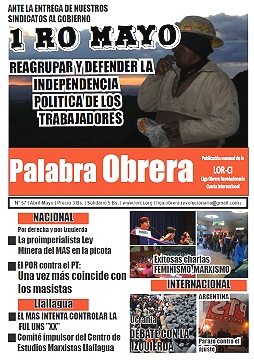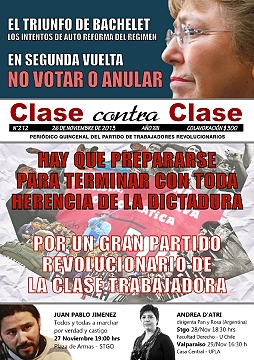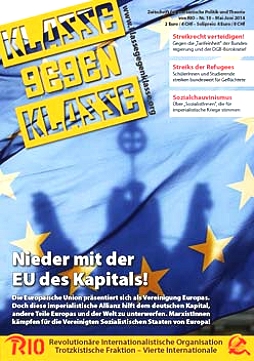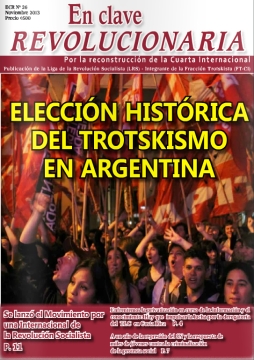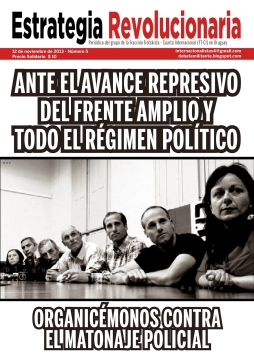Argentina
Lear workers fighting against lay-offs and technical unemployment
12/07/2014
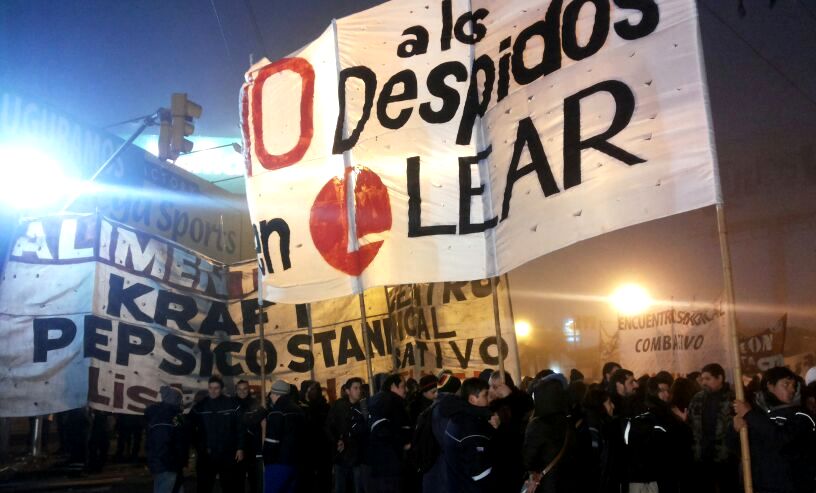
After Gestamp, it is Lear’s turn, another subcontracted company in the automobile industry, to fight. The economic crisis is worsening in Argentina and the automobile industry is one of the hardest hit. Thus, the largest automobile manufacturers have imposed technical unemployment upon their workers. Subcontractors have not only adopted this same policy, but have gone above and beyond by essentially laying off the most combative workers and “class struggle” shop stewards. All of this has been put in place with the complicity of the SMATA union bureaucracy [1], close to Cristina Kirchner’s government and one of the most corrupt and historically violent union bureaucracies, which denounced dozens of activists to the military during the last dictatorship. On Tuesday, July 8, several social and political organizations called for a day of solidarity with Lear workers. The Socialist Workers’ Party played a fundamental role in the organization of this mobilization, which was a great success. Despite this success and the sympathy among workers with regard to this conflict, Lear workers have not yet been able to break the reactionary front made up of the government, the union bureaucracy and the imperialist corporation. The heavy repression against protesters is the very proof of this. However, this repression has had a heavy political cost for the “left-wing” of the government, which describes itself as a government of “human rights”. Just as we are writing this, we can cite dozens of wounded and arrested protesters.
Lay-offs and technical unemployment at Lear
Lear is an American multinational corporation that furnishes seats and electrical cables for vehicles produced by automobile manufacturers such as Ford, Peugeot, etc. It employs 122,000 people in 221 factories in 36 countries across the world, including France. The Pacheco site, in the northern suburbs of Buenos Aires, employs 650 workers. In 2013, it made a profit of nearly 43 million euros. Lear is also known for the fortunes of its highest executives, as well as their anti-union policies and practices of overexploitation. To give a few examples, it forces pregnant women to work on their feet all day long, lays off workers who try to create a union and in an Honduran factory, even went as far as to force workers to wear diapers so they would not waste time going to the bathroom.
On June 30, the site’s management announced a month of technical unemployment for 100 workers. Contrary to what the law stipulates, these workers would not be paid o.]]. However, as management was not satisfied, 100 additional workers were also dismissed. Altogether, a third of workers were concerned by layoffs or technical unemployment.
The fight’s beginnings
“Both my arms are broken [and] they threw me out onto the streets like a dog. Where will I find a new job with broken arms ? And like me, there are many other colleagues who are destroyed by years of work. For this corporation, we are just numbers and when we are no longer useful to them, they chase us away like dogs…”. It is in these words a Lear worker on the picket line in front of the factory expressed her bitterness and her anger against the layoffs and job cuts put in place by the corporation.
Against this injustice, the workers’ reaction was immediate with a walk-out that paralyzed production last Monday. One could observe picket lines, solidarity between other workers and students, and the convergence with Donnely, another striking factory, which has been in the vanguard of combative processes and the embryons of their coordination in the region. All of these measures sought the construction of a ratio of power that would be in favor of workers. Management responded with the only methods it knows : it banned combative union delegates of the internal committee from entering the factory.
The presence of elected officials reinforces the workers’ fight
In the context of a criminal extortion coming from the most parasitic financial capital that is demanding that Argentina pay its foreign debt, this American corporation’s attitude is perceived as a provocation. This has even led to some elected officials of the governmental block to take a stance favorable towards the workers. On Wednesday, July 2, the Provincial Congress of Buenos Aires voted a declaration expressing its concern about these layoffs. The next day, a delegation of the province’s elected officials went to the factory. Management only accepted the admission of elected officials belonging to the left-wing of the government. It did not accept the entry of Christian Castillo, elected official for the Workers’ Left Front and leader of the Socialist Workers’ Party. Once inside the factory, management allowed the visitors to only have contact with workers allied with the union bureaucracy. However, this maneuver failed. The striking workers succeeded in talking with the elected officials whose “visit” greatly encouraged them.
At the same time, the attitude of the government and of the union bureaucracy, which supported each and every illegal measure that Lear’s management decided, made the fraction of the General Confederation of Labor, which opposes itself to the government, declare its support for the workers’ fight and one of its leaders was on the picket line this morning. This serves as proof that the fight against parasitic imperialist capital has an echo among the population subjected to sharply rising unemployment.
The success of the national day of solidarity
It is in this context that a national day of solidarity was organized in order to protest against the layoffs and suspensions of two-hundred Lear workers on Tuesday, July 8. Thus, in Buenos Aires, Rosario, Córdoba, Tucuman, Jujuy, and elsewhere, actions that led to road blockades took place. All of these actions were undertaken by Lear workers joined with various social and political organizations, including the parties that form the Workers’ Left Front, notably the Socialist Workers’ Party, student organizations, factory unions (comisiones internas), human rights organizations, etc. The day was a great success and increased the conflict’s visibility. The government responded with heavy repression, especially in Buenos Aires’ northern suburbs on the Panamerican Highway. Several arrests took place and some protesters were seriously injured, including Victoria Moyano, the daughter of an activist that went “missing” during the military dictatorship and a member of the Centro de Profesionales por los Derechos Humanos (CeProDH) and of the Socialist Workers’ Party, who courageously stood up to the repression alongside other lawyers.
After this brutal repression, the National Security Secretary, Sergio Berni, cynically accused the Workers’ Left Front’s elected officials of “organizing and managing” these protests ; hypocritically, he criticizes them for “participating in road blockades instead of making laws to prevent them.” Additionally, the government is currently looking for Parliamentary allies in order to pass a law against picket lines and road blockades. Christian Castillo, an elected official for the Workers’ Left Front in the province of Buenos Aires and leader of the Socialist Workers’ Party, responded to Berni in this way : “Berni’s discourse seeks to justify the fact that against layoffs and arbitrary and illegal technical unemployment, the government has nothing more to offer other than repression against workers and their families, as well as human rights, social, student and political organizations that support them, as we have seen today (...) We are proud to assist the workers in their fight against layoffs. (...) Lear workers are not alone and are currently showing their determination to fight in order to defend their jobs. We, the elected officials of the Socialist Worker’s Party in the Workers’ Left Front who are present in each and every fight and who defend the working- and lower-classes’ demands as our very own, redouble our commitment and would like to tell Berni and his government that their threats do not scare us.”
While the crisis continues to intensify in Argentina and to be felt in important economic sectors like the automobile industry, workers like those at Lear are in the process of saying that it is not up to them to pay for the capitalists’ crisis. We will continue to follow this very important fight (go here to follow the conflict’s development, in Spanish : http ://www.pts.org.ar/Despidos-masivos-en-Lear).
From France, where automobile workers are also confronted with factory closings, layoffs and attacks against their social rights like those organized by the National Interprofessional Agreement, it is necessary to express our solidarity by signing the petition below.
PETITION in solidarity with Lear Argentineans workers
We condemn the dismissals, layoffs and attacks on Lear delegates !
At the end of May, the multinational Lear Corporation laid off 330 workers from its Pacheco plant in Buenos Aires Province for an indefinite period, without even initiating the bankruptcy proceedings as required by law.
The workers refused to accept the situation and organized assemblies and road blockades. As a result, the Minister of Labor issued a ruling confirming that the suspensions were illegal.
However, in spite of this, the company deepened its attack, suspending 200 of the 330 without pay for 30 days. A few days later, 100 of the 200 were fired without severance pay, leaving them without the means to care for their families or meet their basic needs. This represents an attack on their and their families’ fundamental human rights.
Lear Corporation is an American company with over 122,000 employees at 226 locations in 36 countries. The only buyer of the electrical cable bundles that Lear produces at its Pacheco plant is Ford Argentina, whose production has remained at the same level over the last year. However, Ford is now importing a proportion of the cables it normally buys from Lear from Central America and Europe. Meanwhile, the plant in Pacheco is seeing firings and lay-offs. The actions of Lear and Ford are particularly unprincipled because the Argentine government is giving subsidies to the car industry and has just launched a plan called Pro.Cre.Auto to stimulate car sales, which of course will benefit both companies.
Lear is refusing to pay the salaries of 200 workers and claims that it is in financial crisis when in 2013 alone its total global sales were $16.2 billion.
The shop stewards’ committee has been banned from entering the Pacheco plant, leaving the workers without trade union representation and infringing their fundamental labour rights.
We, the undersigned, condemn the actions of Lear Corporation, a monopoly with a turnover of billions of dollars that has condemned 200 workers and their families to impoverishment. We demand that it obey national labor legislation and international treaties on human rights, and revoke the suspensions and layoffs so that all the workers can return to work.
Send your signature to
NOTASADICIONALES
[1] Trade union for the automobile industry














